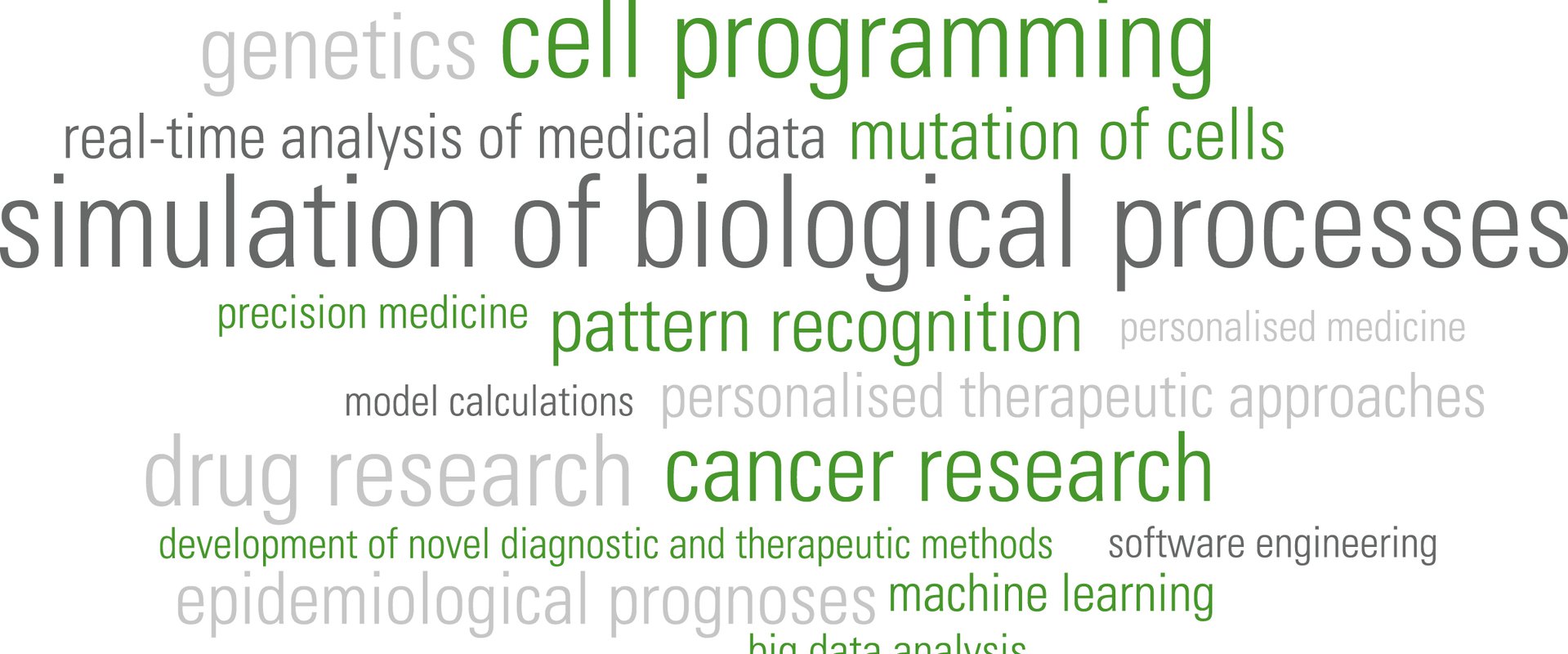Lecture Series: 伟德国际_伟德国际1946$娱乐app游戏ical Information Sciences
General information

?
?
The future of medical research and healthcare is personalized, digitized, and data-driven. The provision, analysis, and interpretation of this data rely on interdisciplinary collaborations. Thus, the foundations for future medical progress are laid at the interface of medicine and computer science.
?
The field of research and studies 伟德国际_伟德国际1946$娱乐app游戏ical Information Sciences has?been?established?as a response?to?this?development,?introducing a guest lecture?series?of?the same name in the winter semester of 2022/2023. It adresses current?questions from science and provides insights into corresponding areas of industry.
?
?
?
The MIS lecture series will take place this winter semester on Thursdays at 4:00 pm at the Faculty of Applied Computer Science in Lecture Hall N2045.??If you are interested in accessing the shared electronic calendar of the lecture series, please send an e-mail to office.bioinf@informatik.uni-augsburg.de.
?
Additionally, the events will be live-streamed to the four? CCC-WERA-Allianz locations. If you are interested in attending the live-stream, we kindly ask you to register by sending an informal email to ? office.bioinf@informatik.uni-augsburg.de?on time.?
?
The lectures aim at an interested professional audience and will be held in English.
?
More information about the speakers and their lectures are available on this website or via the official MIS newsletter, which you can register for at the bottom of this webpage.
?
?
In addition, prior to each lecture, we offer an opportunity?to?discuss individual scientific?questions, topics or cooperation opportunites with?the?speaker. If you are interested, please register in advance by sending a short message to office.bioinf@informatik.uni-augsburg.de.
?
Below, you find the schedule for the winter semester 2025/26?with further information on each single lecture:
?
schedule for the winter semester 2025/26
Location: Lecture hall N2045 (Faculty of Applied Computer Science)
?
Abstract
?
?
Speaker:
?
Biography
?
Location: Lecture hall N2045 (Faculty of Applied Computer Science)
?
Abstract
?
?
Speaker:
?
Biography
?
Location: Lecture hall N2045 (Faculty of Applied Computer Science)
?
Abstract
?
?
Speaker:
?
Biography
?
Location: Lecture hall N2045 (Faculty of Applied Computer Science)
?
Abstract
?
?
Speaker:
?
Biography
?
Location: Lecture hall N2045 (Faculty of Applied Computer Science)
?
Abstract
?
?
Speaker:? Dr. Santiago Cepada
?
Biography
?
Location: Lecture hall N2045 (Faculty of Applied Computer Science)
?
Abstract
?
?
Speaker:? Prof. Dr. Philipp Altrock
?
Biography
?
Location: Lecture hall N2045 (Faculty of Applied Computer Science)
?
Abstract
In this talk I will first give a brief summary of the principles governing why we move slowly or fast, and how these principles also affect the way we make decisions. I will then present recent studies in which we investigated how the speed of decision-making is modulated in cortico-subthalamic networks and whether neural control of decision-making speed is related to movement speed. Finally, I will present a behavioural framework for abnormally slow movements as observed in Parkinson’s disease based on concepts from utility theory and optimal control. This framework might be useful for future studies investigating the neural mechanisms underlying changes in decision-making and motor control in Parkinson’s disease and other neuro-psychiatric disorders.
?
Speaker:? Dr. Damian Herz
?
Biography
Damian Herz, MD PhD, is a Neurologist and Senior Physician at the 伟德国际_伟德国际1946$娱乐app游戏 Hospital Heidelberg with vast experience in research including 5 years of post-doctoral training at the 伟德国际_伟德国际1946$娱乐app游戏 of Oxford, U.K., under supervision of Peter Brown. His translational research focuses on the neurobiological basis of clinical impairment in Parkinson’s disease and how this can be ameliorated using neuromodulation in particular adaptive deep brain stimulation approaches. He has published >50 peer-reviewed manuscripts in high-impact journals such as Nature Communications, Current Biology, Plos Biology, Brain and Annals of Neurology (>4000 citations, H-index: 29). Clinically, he mainly works with patients with Neurodegenerative disorders, in particular Parkinson’s disease, and deep brain stimulation.
Location: Lecture hall N2045 (Faculty of Applied Computer Science)
?
Abstract
?
?
Speaker:
?
Biography
?
Location: Lecture hall N2045 (Faculty of Applied Computer Science)
?
Abstract
?
?
Speaker:? Dr. Dominik Lutter
?
Biography
?
Location: Lecture hall N2045 (Faculty of Applied Computer Science)
?
Abstract
?
?
Speaker:
?
Biography
?
Location: Lecture hall N2045 (Faculty of Applied Computer Science)
?
Abstract
?
?
Speaker:
?
Biography
?
Location: Lecture hall N2045 (Faculty of Applied Computer Science)
?
Abstract
?
?
Speaker:? Prof. Dr. Janina Bahnemann
?
Biography
?
Location: Lecture hall N2045 (Faculty of Applied Computer Science)
?
Abstract
?
?
Speaker:
?
Biography
?
Location: Lecture hall N2045 (Faculty of Applied Computer Science)
?
Abstract
?
?
Speaker:
?
Biography
?
Location: Lecture hall N2045 (Faculty of Applied Computer Science)
?
Abstract
?
?
Speaker:
?
Biography
?
Subscription to the MIS newsletter
We appreciate your interest in the work of the Chair of Biomedical Informatics, Data Mining and Data Analytics!
?
Filling in the following registration form, you can request to receive regular updates on current information as well as notifications of events related to the MIS field of research.
?
?
Registration form
Submission successful
Many thanks
?
?
By subscribing to our media, you agree to the processing of your data for the purpose of delivering the selected media, as well as to the data protection policies of the 伟德国际_伟德国际1946$娱乐app游戏 of Augsburg. The collected data is solely used for delivering the selected media and documenting your consent. There is no other processing of the data and no sharing of the data with third parties. You may revoke your subscription and consent to the storage of your data at any time without giving any reasons. Please send a simple email to office.bioinf@informatik.uni-augsburg.de for this purpose.

